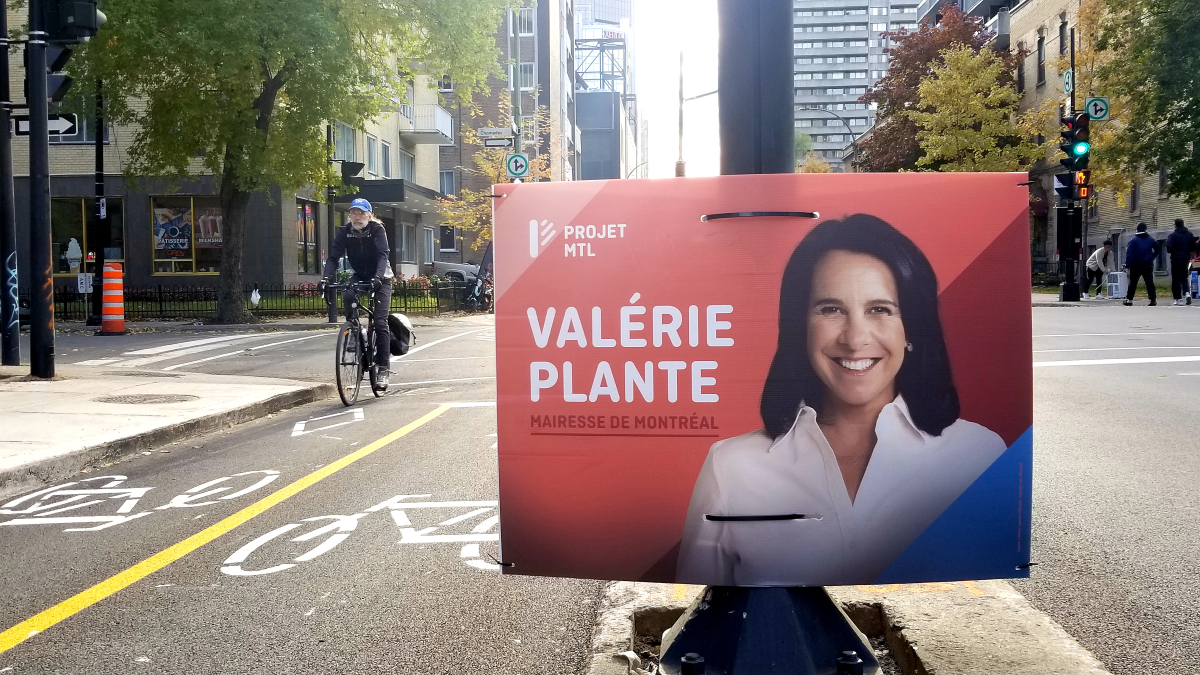Plante enters her second mayoral term with majority support
Valérie Plante won a second term in Montreal’s mayoral race on Nov. 7, earning 52 per cent of the vote. The mayor surpassed her main opponent Denis Coderre by nearly 60,000 votes, and 11 out of 19 boroughs in Montreal will now be governed by Plante’s Projet Montréal party.
In the next four years, the returning mayor promises to improve housing affordability, increase funding for the SPVM, develop more cycling infrastructure and public transit, and also revitalize Montreal’s downtown core.
“We will put all the effort in the world to continue making Montreal a city that we are proud of, where we can raise our children, study, work, and live out our retirement in an active way,” said Plante with a smile during her victory speech.
It was a difficult loss for former mayor Denis Coderre and his Ensemble Montréal party. In late October, the two frontrunners were within one percentage point of each other in the polls, but there was a clear winner on election night as Coderre lost by a 14-point margin.
“The results are clear: you win some, you lose some. But I am very, very pleased I was pushing ideas,” said Coderre at the Ensemble Montréal event on election night. “[…] And I was focusing on the people, because I love the people, I love Montreal and that’s what’s most important — to bring people together!” he exclaimed.
Meanwhile, Movement Montréal’s Balarama Holness, who promised to make Montreal an officially bilingual city-state, came in a distant third place with seven per cent of the vote.
Montrealers, however, did not have a strong showing at the polls, as the 2021 municipal election had a voter turnout of just 38 per cent. The participation rate was four per cent lower than in 2017, despite a larger number of polling stations, mail-in ballots, and the four-day advanced voting.
Michel Bissonnet, mayor of the Saint-Leonard borough, told The Concordian that voting was especially difficult for the elderly population.
“When you’re older and you have to go to vote and you have four [candidates] to vote for, they have four ballots at the same time. It’s easy when it’s a federal or provincial election, it’s one person. But when you get four people, you have to put a picture of the man they recognize — they can’t read, they are not happy,” explained Bissonnet, referencing the fact that voters need to pick the mayor of Montreal, their borough mayor, and city councillors separately.
Unlike the Plante-Coderre race, several boroughs had a very close election that resulted in premature celebrations and recount requests. In Côte-des-Neiges–Notre-Dame-de-Grâce, Ensemble Montréal’s Lionel Perez declared victory over Projet Montréal’s Gracia Kasoki Katahwa on Sunday night, as he was leading in the vote count on Nov. 7. The next morning, however, Katahwa stunned Perez by pulling nearly 200 votes ahead of her opponent by the time all votes had been counted.
In Quebec City, the mayoral race was even more controversial as media outlets made false projections and declared Marie-Josée Savard as the new mayor. Two hours after delivering a heartfelt speech thanking all of her supporters, Savard ended up losing to Bruno Marchand by just 834 votes. TVA Nouvelles and Radio-Canada have since apologized for their decision to call the election prematurely.
As for Montreal, the Plante administration promised its citizens a safer city in its second mayoral term. Projet Montréal is committed to investing an additional $110 million to reduce gun violence, increase the police force by 250 officers, and install body cameras on SPVM agents by 2022.
The mayor also plans to expand Montreal’s blue metro line towards Anjou and build a new line from Montreal-Nord to Lachine — though this promise dates back to Plante’s 2017 campaign and has yet to be fulfilled. Moreover, seniors may be able to ride the STM network free of charge in the coming years.
Other campaign promises include the creation of 60,000 new units of affordable housing, extended operating hours for downtown bars and restaurants, more green spaces, and free parking on evenings and weekends downtown to encourage commercial activities during the holiday season.
Photograph by Bogdan Lytvynenko
